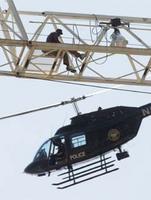
I have strayed like a lost sheep. Seek your servant . . . (Psalm 119:176)
About a mile down the road from our church is a construction site that yesterday became the scene of a high stress, high drama, high profile stand-off. Carl Roland, on the run from police in Florida, climbed the 18 story crane on the construction site late yesterday. As of this writing he’s still there. It’s been more than 20 hours. A densely traveled part of Peachtree Road has been closed, engendering very little sympathy for Mr. Roland.
Watching the T.V. news footage, I’m not surprised that Mr. Roland is up there. I’m surprised that he was able to get up there – but he’s a desperate man. The fact that he’s 18 stories above the ground, threatening to take his own life, that doesn’t surprise me. What I find remarkable is the fact that he’s not the only one up there. Not far from him is a police negotiator, a person who was doing his job, got a call and found himself going up the 18 story crane, sitting up there at significant risk, trying to bring Mr. Roland safely down.
I ask myself: would I go up there to do that? I know the answer: not likely. Of course, I’m not a professional police negotiator – but that’s no excuse. I am a pastor. And if anyone should be willing to go to great lengths to retrieve and bring back a lost soul, surely it should be a shepherd, one who follows the great shepherd Jesus.
Grace means Jesus seeking us. We’re the desperate ones, trying to get to something that will save us or trying to escape a past that threatens and accuses us. Our running isn’t nearly as dramatic as Mr. Roland’s crane climb – but there we are nonetheless. Like Carl Roland, so many are simply stuck, immobilized. And Jesus comes to us.
Jesus lived his life to show us that this is God’s heartbeat toward us. Jesus didn’t set up shop and wait for folks to find him. He didn’t teach only those who managed to get to where he was. Jesus went seeking. He told stories to make this clear to us; lost sheep, lost coin, lost son. He made a plain statement of his purpose: “the son of man came to seek and save that which was lost.”
I’m not nearly as much like Jesus as I’d like to be. And I’m more like Carl Roland than I care to admit. That fact alone reminds me how much I need grace. I need Jesus to come to me. I need compassion and mercy, especially when I don't deserve it.
The final verse of Psalm 119 is a peculiar conclusion to a (very) long meditation on God’s word. This Psalm is written by one who loves God’s law, who is committed to living as the law instructs. These are the words of one who has memorized and pondered and applied the teachings of Torah. And yet, at the end of this lengthy exaltation of God’s law, the Psalmist ends with confession. “I have strayed.” This confession leads to a request. “Seek your servant.” In other words, though we love God’s law and do our best to live it, we stray and wander. Unless God seeks us and brings us back to himself, we’re lost.
We need grace. Perched high on cranes of our own making, we are sought and found. Jesus finds us, sits patiently with us. I want to be more like him. I’ll start here on the ground, and maybe (by grace) work my way up those 18 stories.
